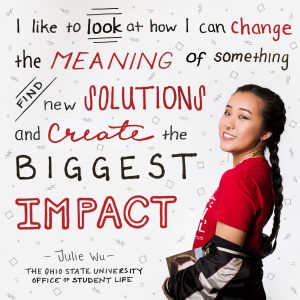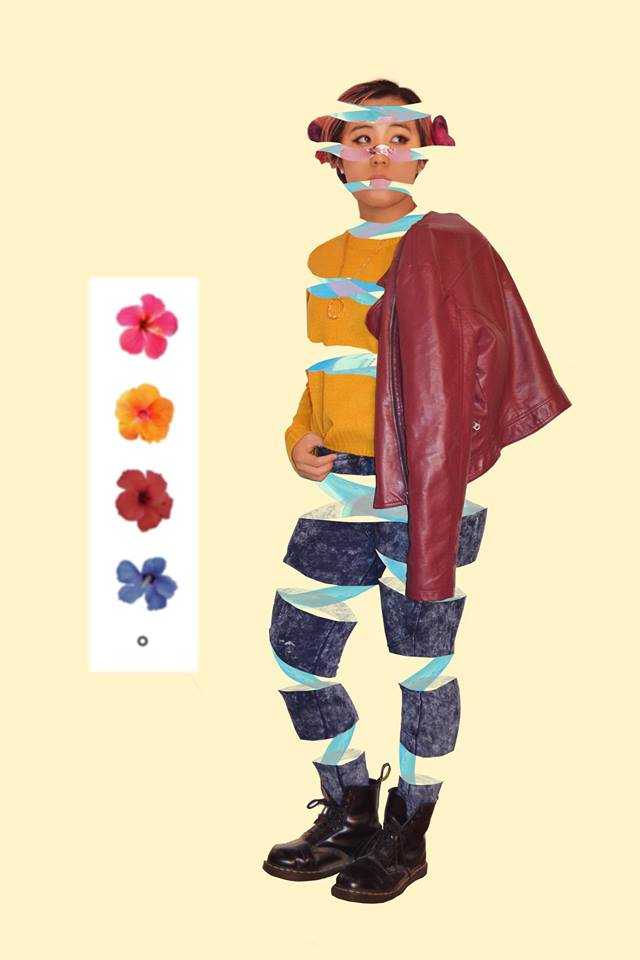By Miranda Koewler
As an Asian American student, fourth year Julie Wu has found that many of her experiences at Ohio State are focused on breaking stereotypes and advocating for understanding. Her story is one of identity, creativity and social justice.
 Miranda: What are you studying and why?
Miranda: What are you studying and why?
Julie: I’m a studio art student. I came in as computer science engineering, but after realizing that the STEM fields weren’t for me, I switched to art. It was always something I enjoyed but never thought I could pursue, with STEM being an expectation others had of me. I’m extremely interested in digital art and the power of social media and technology. I’m fascinated by the outlets that the digital realm creates for putting art out in the world.
What are you involved with at Ohio State and in Columbus?
I’m the Asian American Association president. I’ve been involved with this organization since starting at Ohio State. As a freshman, I was involved with the organization’s leadership development program where I had the opportunity to get a grasp on my identity as an Asian American. I don’t have to choose between an Asian identity and an American one – I can embrace both of them together.
I’m also the president of the Midwest Asian American Student Union (MAASU). Twice a year, thousands of Asian students gather for conferences that focus on social justice, mental health, leadership and professional development – all geared toward the Asian American and Pacific Islander communities.
What are three words to describe you?
First is passionate. Once I find my passions, I fully commit myself to them. Sometimes it changes the path I’m on, but it’s worth it to find what I am happiest doing. Second is spontaneous. I don’t like to sit and contemplate, but rather plunge into things head on. The last one would be creative. As an art major, I like to look at how I can change the meaning of something, find new solutions and create the biggest impact.
How did you get involved as an activist?
My high school was not diverse at all. With only two other people who looked like me, it was a difficult place to thrive, but it was all I’d ever known. In college, I realized how much I would let bullying slide when I was younger. Coming to college and gaining awareness has given me the ability to prevent these things from happening to other kids. I found mentors in the intercultural specialists at the Multicultural Center to encourage me to push for what’s right and help others like me.

One of Julie’s works. This was showcased at the Pan-Asian Mental Wellness Association’s Breaking Out Silence event. To see more of Julie’s work, follow her on Instagram @wuuless.
How are you finding ways to intertwine art and activism in what you do?
I try to root for myself in putting work out there for activism. I often have to explain the history and background of what I do, but that’s the beginning of understanding. Political art does not have to be “in your face.” It helps to show resistance against the shortcomings and internal or external pressures going against me. I try to create art that truly resonates with me rather than making art that is stylistically “pretty.”
Why do you think advocacy and activism are so important?
We are the change makers for the next generation. Both of my parents are immigrants that idealized staying out of the way and not standing up. But I know I deserve the same respect as others born here. We have to be the ones that decide what is right, what is wrong and what we’ll work for.
What do you hope to do in the future?
Recently, I interned with Asian and Pacific Islander American (APIA) Vote. The experience of working for a nonprofit was really eye opening and showed me the importance of loving the work I do for others. Nonprofits do grassroots organizing with a focus on issues first – not money first. I’m also considering going back to school for higher education because I want to help others the way my mentors have helped me.
What advice would you want to pass along to your fellow Buckeyes?
When existing in a society that has a unilateral definition of the way things are or should be, instead of getting stuck in the history of one type of person, we need to expand past that. Take the advantages college offers to find those stories. Take your own experiences into account, but always listen to others as well. Also, speak out for the issues you care about.